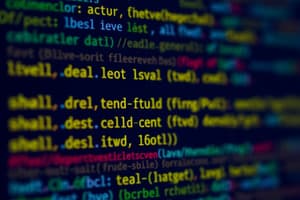Podcast
Questions and Answers
What is the primary benefit of using generics in Java programming?
What is the primary benefit of using generics in Java programming?
- Increases execution speed of collections
- Allows type-safe operations on various data types (correct)
- Simplifies the syntax of data structures
- Reduces the number of collections needed
What is a key benefit of using design patterns in software development?
What is a key benefit of using design patterns in software development?
- They provide reusable solutions to common design problems. (correct)
- They guarantee faster execution of the code.
- They ensure all code is generated automatically.
- They eliminate the need for testing in development.
Which collection class would be ideal for ensuring that elements cannot be duplicated?
Which collection class would be ideal for ensuring that elements cannot be duplicated?
- HashSet (correct)
- HashMap
- ArrayList
- LinkedList
Which of the following describes the purpose of Java modules?
Which of the following describes the purpose of Java modules?
What does the term 'concurrency' primarily refer to in Java programming?
What does the term 'concurrency' primarily refer to in Java programming?
Lambda expressions in Java are primarily used for what purpose?
Lambda expressions in Java are primarily used for what purpose?
Which statement about exception handling is true?
Which statement about exception handling is true?
Which tree traversal method visits the nodes in the order of left subtree, root, and then right subtree?
Which tree traversal method visits the nodes in the order of left subtree, root, and then right subtree?
Which of the following is a key characteristic of annotations in Java?
Which of the following is a key characteristic of annotations in Java?
What is a primary function of testing frameworks like JUnit and TestNG in Java development?
What is a primary function of testing frameworks like JUnit and TestNG in Java development?
What role does reflection play in Java?
What role does reflection play in Java?
Which sorting algorithm is known for its divide-and-conquer approach?
Which sorting algorithm is known for its divide-and-conquer approach?
What common issue should be considered when implementing reflection in Java?
What common issue should be considered when implementing reflection in Java?
Which type of stream is used for handling byte data in Java I/O operations?
Which type of stream is used for handling byte data in Java I/O operations?
What is a common issue addressed when managing concurrency in Java applications?
What is a common issue addressed when managing concurrency in Java applications?
Which graph traversal method would you use to explore all nodes at the present depth prior to moving on to nodes at the next depth level?
Which graph traversal method would you use to explore all nodes at the present depth prior to moving on to nodes at the next depth level?
Flashcards
Generics
Generics
A mechanism in Java that allows you to work with collections of various data types safely without sacrificing type safety. It's like having a template for your collection, ensuring the data put in is of the correct type.
Collections Framework
Collections Framework
Java's built-in framework that provides a wide range of data structures like Lists, Sets, and Maps for effective data management.
Concurrency
Concurrency
Java's powerful feature that allows your programs to run multiple tasks simultaneously, making applications more responsive and efficient.
I/O Operations
I/O Operations
Signup and view all the flashcards
Exception Handling
Exception Handling
Signup and view all the flashcards
Annotations
Annotations
Signup and view all the flashcards
Reflection
Reflection
Signup and view all the flashcards
Custom Exception Classes
Custom Exception Classes
Signup and view all the flashcards
Design Patterns
Design Patterns
Signup and view all the flashcards
Lambda Expressions
Lambda Expressions
Signup and view all the flashcards
Modules
Modules
Signup and view all the flashcards
Third-Party Libraries
Third-Party Libraries
Signup and view all the flashcards
Graphs
Graphs
Signup and view all the flashcards
Trees
Trees
Signup and view all the flashcards
Advanced Algorithms
Advanced Algorithms
Signup and view all the flashcards
Study Notes
Core Concepts in Advanced Java Programming
- Generics: Enable type-safe operations on collections and data structures. Generic types are parameterized types that can operate on various data types without losing type safety, improving code maintainability and reducing errors.
- Collections Framework: Java's comprehensive framework for working with collections (e.g., Lists, Sets, Maps). Understanding interfaces like
List,Set, andMap, and their implementation classes (e.g.,ArrayList,HashSet,HashMap) is crucial for performance optimization by choosing the appropriate collection type. - Concurrency: Java's robust support for concurrent programming. Threads and concurrency utilities like
Thread,Runnable, synchronization mechanisms (synchronized,locks,atomic variables), and concurrent collections enable responsive and scalable applications. Understanding threading models, concurrent data structures, and handling race conditions, deadlocks, volatile variables, and memory barriers is crucial. - I/O Operations: Advanced techniques for reading and writing data to files, networks, and other sources. Understanding stream-based I/O and working with
InputStream,OutputStream,Reader, andWriteris essential. Character streams, byte streams, file handling, and network communication usingSocketsare part of I/O operations.
Exception Handling and Advanced Features
- Exception Handling: Advanced exception handling involves understanding different exception types, custom exception classes, and handling them using
try-catch-finallyblocks. Exception chaining propagates errors, enabling effective identification of error origins. - Annotations: Java annotations provide metadata to the code, offering advantages like code validation, documentation, and compilation/runtime processing. Annotations are essential for understanding their use in libraries and frameworks, metadata storage, and other uses.
- Reflection: Reflection enables a Java program to inspect and modify its runtime structure (classes, members, methods). Dynamic instantiation, method invocation, and field modification are possible functionalities. Reflection is used for code generation, debugging, and creating libraries compatible with varied objects; however, potential pitfalls, such as performance and security issues, should be acknowledged.
Design Patterns and Advanced Concepts
- Design Patterns: Design patterns offer reusable solutions for common design problems. Understanding commonly used patterns like Factory, Observer, Singleton, and others is essential for creating maintainable, understandable, and reusable code. Their application within a Java project is key.
- Lambda Expressions and Streams: Java 8 introduced lambda expressions, allowing concise and functional code. Understanding lambda expressions and Java Streams enhances functional programming capabilities, incorporating concepts like passing functions as arguments within Java applications.
- Modules: Java modules organize and compartmentalize codebases, thereby managing different components within the program for maintainability, security, better management.
Working with Libraries and Frameworks
- Third-Party Libraries: Leveraging external libraries (like Apache Commons) provides specific functionalities for data processing, file handling, or web services. Appropriate library integration and comprehension of their purpose and function are required.
- GUI Frameworks (e.g., Swing, JavaFX): Developing graphical user interfaces (GUIs) using frameworks like Swing and JavaFX involves using components, layouts, and event handling capabilities.
- Testing Libraries: Testing frameworks (like JUnit or TestNG) are vital for unit testing, integration testing, and general testing; understanding test-driven development (TDD) principles is important.
Advanced Data Structures and Algorithms
- Trees (e.g., Binary Trees, B-Trees, Heaps): Understanding tree traversal (in-order, pre-order, post-order), applications, and tree types and properties.
- Graphs: Working with graph data structures, grasping graph traversals (e.g., Depth-First Search (DFS), Breadth-First Search (BFS)) and applying graphs in algorithm design and problem-solving across varying fields.
- Advanced Algorithms (Sorting, Searching): Implementing and understanding different sorting (e.g., merge sort, quick sort, heap sort) and searching (binary search, hash table search) algorithms, examining their time and space complexities for efficiency and application in Java programs.
Studying That Suits You
Use AI to generate personalized quizzes and flashcards to suit your learning preferences.




